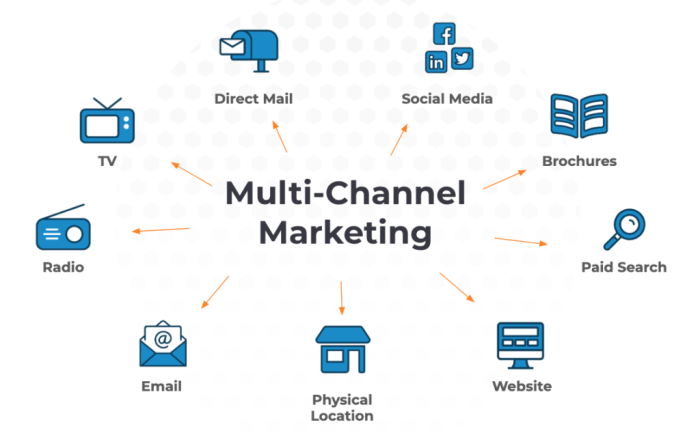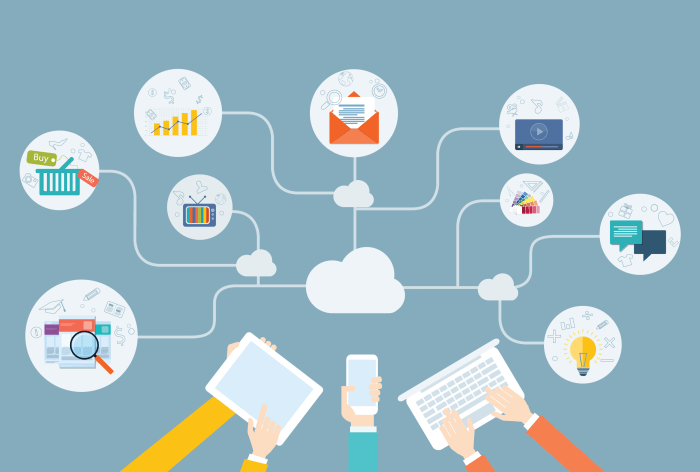Diving into Multi-Channel Marketing, get ready to explore how businesses are expanding their reach in today’s digital world. From social media to email, learn how to create a seamless experience for your customers.
Discover the benefits, challenges, and strategies behind this dynamic approach to marketing.
Definition of Multi-Channel Marketing
Multi-channel marketing is a strategy that involves businesses interacting with customers across various channels, both online and offline, to create a seamless and consistent experience. In today’s digital age, where consumers have multiple touchpoints and expect personalized interactions, multi-channel marketing plays a crucial role in reaching and engaging with target audiences effectively.
Examples of Successful Businesses Using Multi-Channel Marketing
Many businesses have successfully implemented multi-channel marketing strategies to enhance their customer experience and drive sales. Some examples include:
- Amazon: Amazon uses a combination of online platforms, such as their website, mobile app, and social media channels, along with physical stores like Whole Foods, to reach customers at different touchpoints.
- Starbucks: Starbucks utilizes a mobile app for ordering, rewards program, and in-store pick-up, along with social media promotions and email marketing to engage customers across various channels.
- Nike: Nike combines its e-commerce website, retail stores, social media presence, and partnerships with influencers to create a cohesive brand experience for customers.
Difference Between Multi-Channel Marketing and Omni-Channel Marketing
While multi-channel marketing focuses on reaching customers through different channels, omni-channel marketing takes it a step further by providing a seamless and integrated experience across all channels. Omni-channel marketing aims to create a unified customer journey, where interactions on one channel seamlessly transition to another, offering a consistent brand experience regardless of the touchpoint.
Benefits of Multi-Channel Marketing

Multi-channel marketing offers a myriad of advantages for businesses looking to expand their reach and boost brand visibility. By utilizing multiple channels in marketing campaigns, companies can effectively engage with customers across various platforms, increasing the likelihood of conversion and brand loyalty.
Increased Brand Visibility and Reach, Multi-Channel Marketing
Utilizing multiple channels allows businesses to reach a wider audience and increase brand visibility. By being present on various platforms such as social media, email, websites, and physical stores, companies can ensure that their brand is exposed to a larger pool of potential customers. This increased visibility can lead to higher brand recognition and recall among consumers, ultimately driving sales and revenue.
Effectiveness of Multi-Channel Marketing
Statistics show that businesses implementing multi-channel marketing strategies experience higher conversion rates and customer engagement compared to those using single-channel approaches. According to a study by Forbes, companies with strong multi-channel customer engagement strategies retain an average of 89% of their customers, while those with weak strategies only retain 33%. This highlights the effectiveness of multi-channel marketing in building customer loyalty and driving repeat business.
Strategies for Implementing Multi-Channel Marketing
Implementing a successful multi-channel marketing strategy requires careful planning and coordination across various channels to ensure a seamless customer experience. By integrating different channels such as social media, email, and offline channels, businesses can reach their target audience more effectively and drive engagement. Here are some key strategies for implementing multi-channel marketing:
Creating a Cohesive Multi-Channel Marketing Plan
To create a cohesive multi-channel marketing plan, businesses should follow these steps:
- Identify target audience: Understand your target audience and their preferences to tailor your message across different channels.
- Set clear goals: Define specific goals for each channel and align them with your overall marketing objectives.
- Consistent messaging: Ensure a consistent brand message and tone across all channels to maintain brand identity.
- Integrated campaigns: Develop integrated campaigns that leverage the strengths of each channel for maximum impact.
- Measure performance: Monitor and analyze the performance of each channel to optimize your marketing efforts.
Integrating Different Channels
Integrating different channels such as social media, email, and offline channels can be achieved through:
- Cross-promotion: Promote your social media channels in email campaigns and vice versa to drive traffic and engagement.
- Consistent branding: Maintain consistent branding across all channels to create a unified brand experience for customers.
- Omni-channel approach: Adopt an omni-channel approach that seamlessly integrates online and offline channels to provide a seamless customer experience.
Measuring the Success of Multi-Channel Marketing Efforts
To measure the success of multi-channel marketing efforts, businesses can:
Track key performance indicators (KPIs) such as conversion rates, click-through rates, and customer acquisition costs to evaluate the effectiveness of each channel.
- Use analytics tools: Utilize analytics tools to track customer interactions across different channels and identify areas for improvement.
- A/B testing: Conduct A/B testing to compare the performance of different marketing strategies and optimize your campaigns accordingly.
- Customer feedback: Gather feedback from customers through surveys and social listening to understand their preferences and improve your marketing efforts.
Challenges of Multi-Channel Marketing

Implementing multi-channel marketing can come with its fair share of challenges for businesses. From maintaining consistent branding across different channels to managing customer data effectively, there are several obstacles that companies may face in their multi-channel marketing efforts.
Consistent Branding
One of the main challenges in multi-channel marketing is ensuring consistent branding across all channels. With each channel having its unique audience and tone, maintaining a cohesive brand image can be difficult. To overcome this challenge, businesses should develop brand guidelines that clearly Artikel messaging, visuals, and tone for each channel. Consistent monitoring and regular audits can also help ensure brand consistency across all touchpoints.
Data Integration
Another common challenge is effectively integrating customer data from various channels. Siloed data can lead to an incomplete view of the customer, making it challenging to deliver personalized and targeted marketing campaigns. Implementing a robust Customer Relationship Management (CRM) system that consolidates data from different channels can help businesses overcome this challenge. By centralizing customer data, companies can create a unified customer profile for more effective targeting.
Channel Coordination
Coordinating marketing efforts across multiple channels can be complex and time-consuming. Different channels may require different strategies and messaging, making it challenging to ensure a seamless experience for customers. To address this challenge, businesses should invest in marketing automation tools that allow for coordinated campaigns across various channels. By automating processes and workflows, companies can streamline their multi-channel marketing efforts and deliver a consistent message to customers.
Examples of Success
Several companies have successfully navigated the challenges of multi-channel marketing. One such example is Nike, which seamlessly integrates its online store, mobile app, social media, and physical retail locations to provide a unified shopping experience for customers. By leveraging data and technology, Nike delivers personalized product recommendations and targeted promotions across all channels, creating a seamless shopping journey for its customers.





